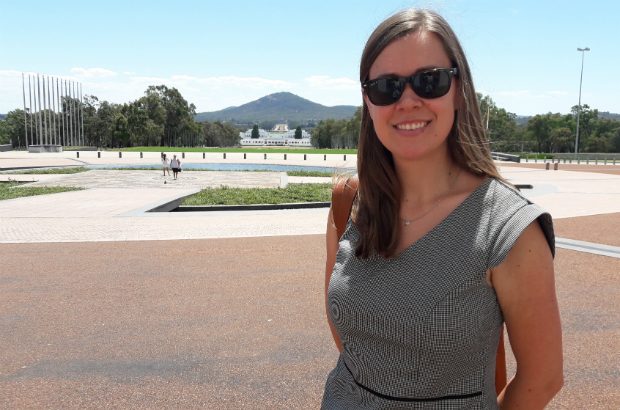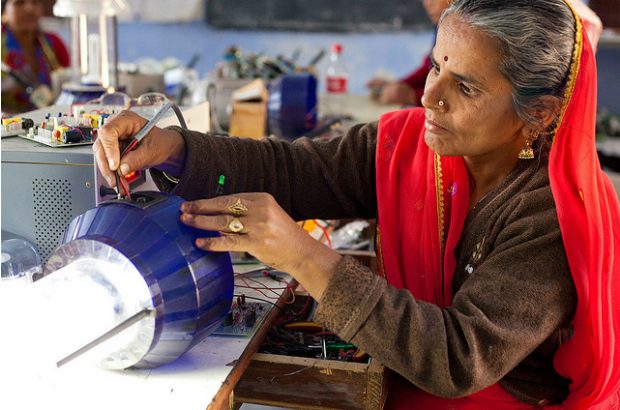GSE member Cate Setterfield brilliantly exemplifies the inclusivity of the GSE profession by working in a science role without having a formal background in science.
It’s been a few months since I began my role as part of the UK Science and Innovation Network (SIN) in Australia, working to strengthen cooperation and build partnerships on science and innovation.
As with any new job, I’ve had a lot to learn, including approximately a million different building access codes. But, one of my biggest challenges has been coming up with a clear answer to the question people inevitably ask when I tell them what I do; “So, do you have a background in science?”
The short answer is no: I have no academic background in science. I dropped science after GCSE; and my undergraduate degree is in modern languages. I have been known to use the word ‘sciencey’ (but never to describe myself).

A ‘sciencey’ role
It’s probably a good thing, then, that my job doesn’t involve performing experiments or doing scientific research. What it does involve is building relationships, influencing policy, and providing strategic advice and analysis. As a policy person with a background in journalism, these are things I know how to do.
One of the best things about working in SIN (other than the brilliant acronym) is just how varied the job is. In less than six months, I’ve worked on clean energy, genomics, antimicrobial resistance, and even space. The variety is great, but it also means there isn’t time to go too deeply into any particular issue. In that sense, it helps to be a generalist.

Women in STEM
Despite these arguments, I sometimes wish I had more of a science background. At school I was good at science, but wasn’t encouraged to pursue it. Things might have been different if I’d had stronger female role models, or been better informed about the career prospects that science offers.
Both the UK and Australia can do more to encourage students, especially girls, to pursue STEM careers. Of the 2.3 million Australians that are qualified in STEM subjects, only 16% are women. In the UK, women make up just 14.4% of the STEM workforce. As High Commissioner Menna Rawlings said at last year’s Magna Carta lecture, the UK and Australia can work together to improve this.
You as GSE members can be powerful role models by taking part in outreach at local schools or universities as STEM ambassadors. Tomorrow (February 11th) is the UN’s “International Day of Women and Girls in Science”, so now is a great time to sign up and be an active role model.
Raising the profile of science and scientists in government is really important, and the Government Science and Engineering (GSE) profession plays an important role in doing that. I’m pleased that the new GSE Profession Strategy makes diversity and outreach a priority. Science and innovation are for everyone; it doesn’t take a rocket scientist to see that.
How you can get involved with GSE
If you’re a GSE member and would like to write a post for our blog detailing your work, experiences, and stories or are holding an event for members, then email GSE@go-science.gsi.gov.uk
Sign up to the GSE blog to keep up to date with the work of the GSE profession.
Join the GSE profession; we welcome all civil, crown and public servants with a background or interest in science, engineering and technology.








2 comments
Comment by George Onslow posted on
Interesting article. I find myself challenged regarding some aspects. "As a policy person with a background in journalism" I am sure that Cate can communicate effectively, but can anybody with no scientific training tell the whole story. I think that communications about science by non scientists is only part of what is needed.
I am also concerned about "Science and innovation are for everyone; it doesn’t take a rocket scientist to see that." One does need scientific training to be a practising scientist, and comments like this do not help the case of those scientists working in government who worked hard. Diversity and outreach are important but so is valuing what you have got.
Comment by Jenni Akers posted on
Thanks for your comment. GSE members hold a diversity of roles from deep specialists to those working in science communications. Information on these can be found here - https://governmentscienceandengineering.blog.gov.uk/gse-professional-categories. We welcome blog contributions from all members, so please feel free to contact us with a blog idea yourself. More information about the type of work SIN does can be found in their impact studies - https://www.gov.uk/government/collections/uk-science-and-innovation-network-impact-stories